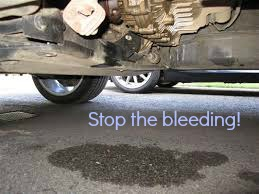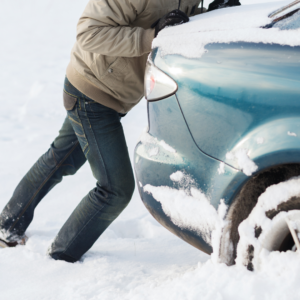Why Is My Oil Leaking In Between Oil Changes?
Are you losing oil in between oil changes? Seeing fluid underneath your car? Wondering where it is going, or where it might be leaking from?

Vehicles can lose oil from a variety of locations, either by “burning” oil or from leaks.
Every week at our shop, we see cars that come in for service that have NO oil on the dipstick. This means that for some amount of time, there has been little to no lubrication on the moving parts of the engine (kind of like the Tin Man in the Wizard of Oz!). And like the Tin Man, those parts can seize and completely stop moving, leaving you stranded on the side of the road.
As a car owner, be aware of any fluids that accumulate under your vehicle. Pay attention your garage floor or driveway where you park, and if you see oil or fluid, it is important to find out what it is and where it is coming from before that reservoir runs dry.
Where Does the Oil Go & Where Does it Come From?
So, where does the oil go? Isn’t it a closed system? In newer vehicles, it is a closed system. But with time and higher mileage (especially over 100,000 miles), valve seals get hard and lose their ability to hold the oil. Also, piston oil rings can wear over time, especially if there is excessive time and miles between oil changes, and that can be a source of oil usage .
Oil leaks generally come from a few common places: oil filter or oil pan, front crank seal, rear main seal, cam seals, and/or valve cover gaskets.
An oil filter that is not seated properly will leak. Oil filters should be changed at every oil change service and if the oil filter is not put on correctly, there can be leakage. Case in point, a young woman came in that had had her oil changed 5 months ago at another shop, and since she never checked her oil, she did not realize that she was losing oil. One day, her car simply stopped running because the oil had run dry and her engine seized. If she had checked her oil even once a month, she would have noticed that she was losing oil consistently, and there would have been no damage. Instead, she was facing a $5-6,000 engine replacement.
Similarly, an oil drain plug in the oil pan can be left loose, or worse, over tightened. We have had to replace several oil pans (about a $500 repair) because the threads in the drain plug were stripped, and only repairable by total replacement.
Crank seals, cam seals, and valve cover gaskets can also leak oil, as they lose elasticity over time. These seals and gaskets can be replaced and the oil leak stopped.
High mileage oil and some high quality additives are often helpful in older cars (for example, my 2004 Honda Element that has over 204,000 miles). They can help seal off these common areas of leakage and slow down the usage of oil, in between oil changes.
We at Honest Accurate Auto Service emphasize the importance of checking your oil level on the dipstick at least once a month, and ideally at every gas fill-up, so that you are aware of the level of oil and any changes that may be occurring.
If you are not comfortable checking your oil, or would like to know how to check your oil properly, stop by at either of our locations for a quick complimentary oil check. Being proactive, especially in this area of car maintenance, can ward off catastrophic engine damage.




